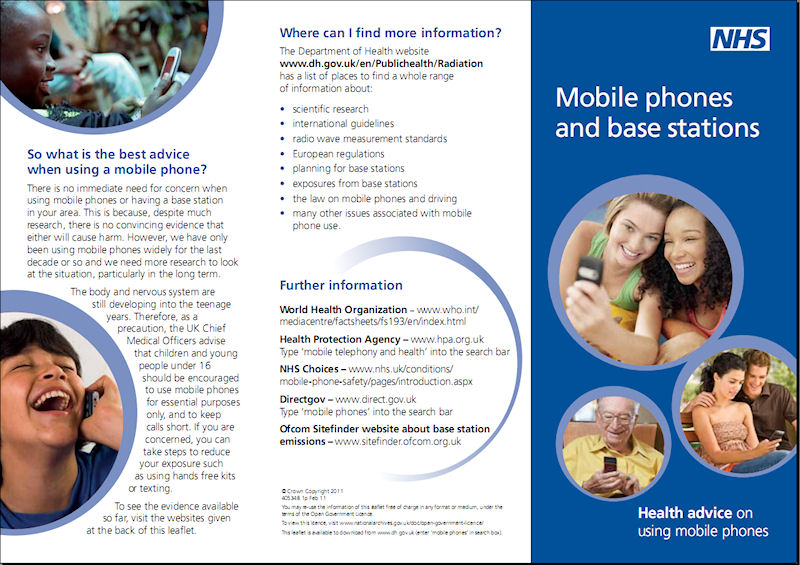 |
 |
|
 |
 |
About Us | Contact |
|
|
07/03/2011 - UK Department of Health issues new mobile phone leaflet
Department of Health now clearly advocate phone precautionEleven years on, if you read the leaflet carefully, the Department of Health have given more precautionary advice. Mobile phone use increased in the UK from about 2% of the population in 1992 to over 80% in 2007. Please note that extra caveats are being added. There is no more re-assurance that mobile phones are safe now than there was 11 years ago. Think on that. Especially if your children or grand-children have their own mobile phones. The Department of Health has re-stated: "Therefore, as a precaution, the UK Chief Medical Officers advise that children and young people under 16 should be encouraged to use mobile phones for essential purposes only, and to keep calls short." Have you told your children or grand-children that? Have you given them a mobile phone and increased their chance of developing a brain tumour in 25 years time? Please do not be re-assured by recent news stories saying that they are safe and that there is no evidence of an increase in brain cancer. This thoughtful response by Professor Dariusz Leszczynski to the contents of the scientific paper that led to the "mobiles are safe" news stories helps to give a better perspective: betweenrockandhardplace. We are not saying don't give the youngsters a mobile phone (at least at secondary school age) - but do make sure they practice 'safe mobile phoning'. There is a massive upsurge of evidence of probable long-term harm. We find it convincing even if the UK Government does not. We note that UK Government tax revenue from mobile phones now exceeds about £18bn per year - maybe this influences what they find "convincing". Children and young people under 16 (from 2005 leaflet)Mobile phones are very popular with young people and have obvious attractions for personal security and keeping in touch with others. Parents and young people should make their own informed choices about the use of mobile phones. The current balance of evidence does not show health problems caused by using mobile phones. However the research does show that using mobile phones affects brain activity. Below, it is our bolding and underlining - not the DH's. What does the science say about safety? (from 2011 leaflet)Research focusing on mobile telephony over the last ten years has shown no convincing evidence that the radio signals from mobile phones and base stations cause adverse health effects (refer to World Health Organization (WHO) website). In the UK, the Health Protection Agency (HPA) closely monitors all mobile phone and health research. Apart from an accident risk when using a phone while driving, it states, "...there is no clear evidence of adverse health effects from the use of mobile phones or from phone masts." However, as people have only been using mobile phones for relatively few years, the HPA advises that more research be carried out, especially to investigate whether there might be longer term effects. So what is the best advice when using a mobile phone? (from 2011 leaflet)There is no immediate need for concern when using mobile phones or having a base station in your area. This is because, despite much research, there is no convincing evidence that either will cause harm. However, we have only been using mobile phones widely for the last decade or so and we need more research to look at the situation, particularly in the long term. The body and nervous system are still developing into the teenage years. Therefore, as a precaution, the UK Chief Medical Officers advise that children and young people under 16 should be encouraged to use mobile phones for essential purposes only, and to keep calls short. If you are concerned, you can take steps to reduce your exposure such as using hands free kits or texting. Powerwatch viewWe believe that there is plenty of evidence. We also have a series of useful articles on children and mobile phones. Download the new leaflet from 2011 DH Mobile phone advice page. |


 The UK Department of Health has today released an update of the UK Mobile Phones and Health leaflet. The last time this leaflet was available was in 2005 and that was virtually a simple reprint of the 2000 leaflet issued after the Stewart IEGMP Report.
The UK Department of Health has today released an update of the UK Mobile Phones and Health leaflet. The last time this leaflet was available was in 2005 and that was virtually a simple reprint of the 2000 leaflet issued after the Stewart IEGMP Report.